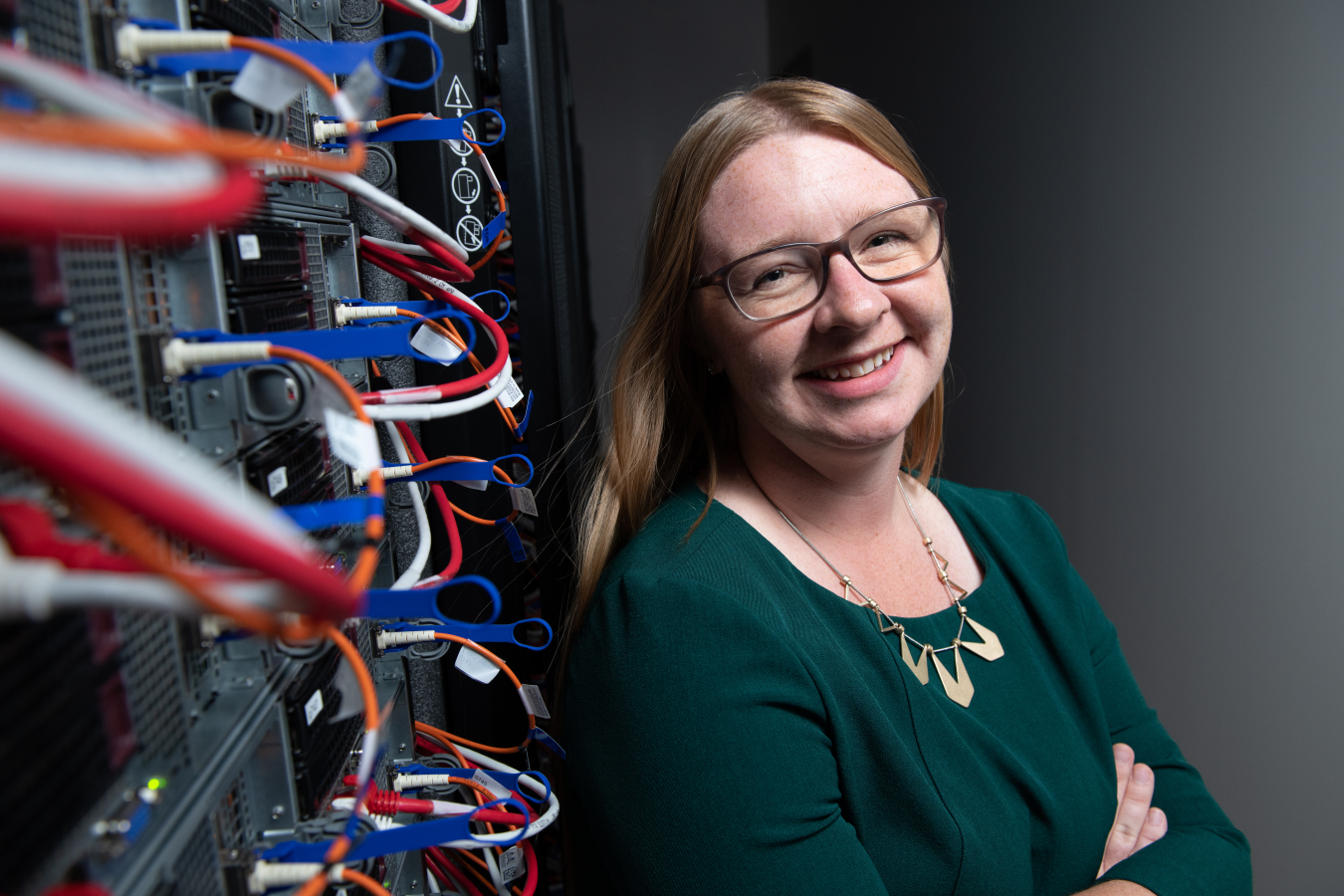Learn why Dr. Sam Johnson loves her job in computational chemistry at Pacific Northwest National Laboratory.
October 7, 2019
Sam Johnson uses computational chemistry to discover how catalysts use their structure and surroundings to make fuels from small molecules. Her work in the Physical Biosciences group at Pacific Northwest National Laboratory aims to identify catalysts that can store energy from intermittent energy sources like solar or wind power. Sam’s expertise in computational chemistry and knowledge of catalysis allows her to discover and confirm fundamental principles of chemistry to gain an atomic level understanding of catalytic materials. The first college graduate and the first to go to graduate school in her immediate family, Sam earned a Ph.D. in Materials Science from Cal Tech after completing a B.S. in Chemical Engineering from University of Colorado, Boulder.
What inspired you to work in STEM?
I was convinced I’d go into law, journalism, or political science until my high school counselor made me take a chemistry class my junior year. I was bitter about having to take that class, but I kind of fell in love with it. I grew up in rural Colorado when corn ethanol was starting to get big, and I thought I’d help my community through using STEM technologies to improve biofuels. That didn’t end up panning out, but one thing that’s cool about my vein of research is there are other paths to sustainable energy. My initial interest has led me toward studying a more distributed means of energy production and developing methods where energy can be stored on the site of production. This can be a benefit in rural areas, because it means we don’t have to centralize around large factories.
What excites you about your work at the Energy Department?
I get to work with incredible experts and amazing resources. I love how, in my work at the national laboratory, I am able to interface with many people in the field, including academia.
How can our country engage more women, girls, and other underrepresented groups in STEM?
We’re making great strides to involve and interest girls, women, and other groups in STEM, but it’s time to do more about the women who leave. Some women leave because STEM is not a good fit for a family; others leave because the expectations can sometimes be unattainable. Many women back out early. Everyone benefits with expanded childcare and family leave. Those things help both men and women.
Underrepresented groups need role models who also serve as advocates, which comes as a cultural shift. My colleagues who thrive often have families who support them. People underestimate how important upbringing is. When you come from a well-educated family, there’s an understanding of the future path, and you have built-in role models. Underrepresented and first-generation individuals have to seek that outside the family, which means that the unwritten rules of succeeding in professional life aren’t inherently conveyed from a young age. That being said, my family was supportive even when they were confused about where studying in academia was going to take me. They gave me all sorts of practical skills like using tools or working hard. My advisors and mentors helped me see how those skills could be transferred to my research. They became a sort of family, as well. They also served as incredible advocates, actively introducing me to the next steps. Women and underrepresented individuals need more advocates, not just mentorship. The difference is critical: mentors give advice, but advocates are active; they use their station to help promote good, underrepresented scientists to get greater consideration and more recognition.
Do you have tips you'd recommend for someone looking to enter your field of work?
Don’t underestimate the importance of developing relationships and communication skills. You can and should ask for mentorship and advocacy. Seek people who match well with you, no matter their gender. And know that most people are willing and waiting to make the introductions to people to help you, so don’t be afraid to ask. I’ve never felt so honored as when my undergraduate students turn to me for advice. Learn to find and be a science sounding board. Not growing up in an environment where we discussed science issues, I could feel really vulnerable talking about my work. The relationships I formed were a safe place to learn how to talk about what I did and why. It’s critical to be able to discuss your work with different people who have varied experience and levels of understanding. Practice with people you trust who can vet your ideas. And realize that you probably will keep revisiting things that you’re interested in. Every time you go back, you’ll know a little more and realize there’s so much more to be studied. You should also read, read, read and know the science. Know what’s happening in the field and know the challenges. That can help address some of the vulnerability you might feel, because you’ll feel prepared.
When you have free time, what are your hobbies?
I play ultimate frisbee, and I cycle a lot. I meet other people when I’m doing that, and I’ve made connections there. I believe it’s important to give yourself time to rest, to take a mental break and let your mind do the unconscious processing it has to do. There’s a reason people get some of their best thoughts in the shower!
Learn more about our programs & resources for women and girls in STEM at /women

